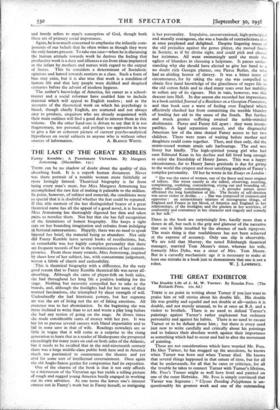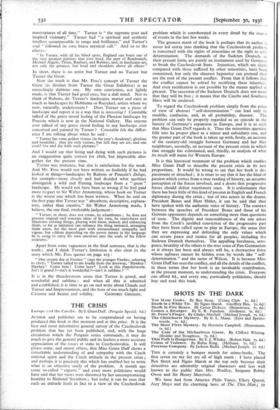THE GREAT EXHIBITOR
THERE is no point in writing about Turner if you just want to praise him or tell stories about his double life. His double life was grubby and squalid and not double at all—unless it is double, and not merely unusual, to be at once an R.A. and a visitor to brothels. There is no need to defend Turner's paintings against Turner's rather unpleasant but ordinary personality and against his habits. There is no need to excuse Turner or to be defiant about him ; but there is every need just now to write carefully and critically about his paintings and to balance their absolute worth against their importance as something which had to occur and had to alter the movement of painting.
These are not considerations which have worried Mr. Foss. He likes Turner, he has mugged up the anecdotes, he knows when Turner was born and when Turner died. He knows that several things happened in that extent of time, but for all that he understands, for all that he cares or criticises, for all the trouble he takes to connect Turner with Turner's lifetime, Mr. Foss's Turner might as well have lived and painted on one of the outer Hebrides. Mr. Foss is simply convinced that Turner was Supreme : " Ulysses Deriding Polyphemus is un- questionably his greatest work and one of the outstanding
masterpieces of all time." Turner is " the supreme poet and inspired visionary." Turner had " a spiritual and aesthetic intellect unsurpassable in range and brilliance," and Turner's soul " followed its own brave mystical call." And so to the
clima-c " In Turner, with all his blind spots, England can boast one of the very greatest painters that ever lived, the peer of Rembrandt, Michael Angelo, Titian, Raphael, and Rubens, and, in landscape-art, not only the greatest, but head and shoulders above all others."
In short, there is no artist but Turner and no Turner but
Turner the Great.
Now the truth is that Mr. Foss's concept of Turner the Great (as distinct from Turner the Great Exhibitor) is an exceedingly dubious one. My own conviction, not lightly made, is that Turner had good eyes, but a dull mind. Not to think of Rubens, do Turner's landscapes matter and exist as much as landscapes by Hobbema or Ruysdacl, artists whom we now, naturally, underesteem ? Does Turner see a piece of
landscape and report it in a way that is interesting ? Constable talked of the grave moral feeling of the Phocion landscape by Poussin which is now in the National Gallery. Has anyone ever talked of any grave moral feeling in any landscape ever conceived and painted by Turner ? Constable felt the differ-
ence I am talking about when he said :
" Turner has some golden visions (in the year's Academy), glorious and beautiful ; they are only visions, but still they are art, and one could live and die with such pictures."
And I would say that living and dying with such pictures is an exaggeration quite correct for 1828, but impossible alto- gether for the present time.
Turner was immense, but size is satisfaction for the weak.
And Mr. Foss would not have written so foolishly if he had looked at things—landscapes by Rubens or Poussin's Deluge, for example—more closely and had decided what qualities distinguish a wild and flaming landscape from a " great " landscape. He would not have been so wrong if he had paid more respect to Sir Walter Armstrong, whose book on Turner is the wisest one which has been written. When he said on the first page that Turner was " absorbent, descriptive, explana-
tory, rather than creative," Sir Walter Armstrong made, I believe, the one final, irrefutable judgement :
" Turner, in short, does not create, he adumbrates ; he does not present original and concrete ideas of his owia, he reproduces and illustrates existing things, playing with them, indeed, and enhancing them, so far as imitation can enhance the thing imitated, arranging them anew, for the most part with extraordinary sympathy and vigour, but seldom depending on the power innate in the language he is using to carry his own emotions into the souls of his fellow creatures."
Apart from some vagueness in the final sentence, that is the truth ; and I think Turner's limitation is also clear in the story which Mr. Foss quotes on page ros : " One stormy day at Farnley " (says the younger Fawkes, referring to 181o), " Turner called to me loudly from the doorway, Hawkey ! Hawkey ! Come here ! Come here I Look at this thunderstorm. Isn't it grand ?—isn't it wonderful ?—isn't it sublime ? ' "
It is in the thunderstorm sense that Turner is grand, and wonderful and sublime ; and when all this is admitted and established, it is time to go on and write about Claude and Turner and Impressionism, and the bore of too much light and
Cezanne and Seurat and solidity. GEOFFREY GRIGSON.















































 Previous page
Previous page